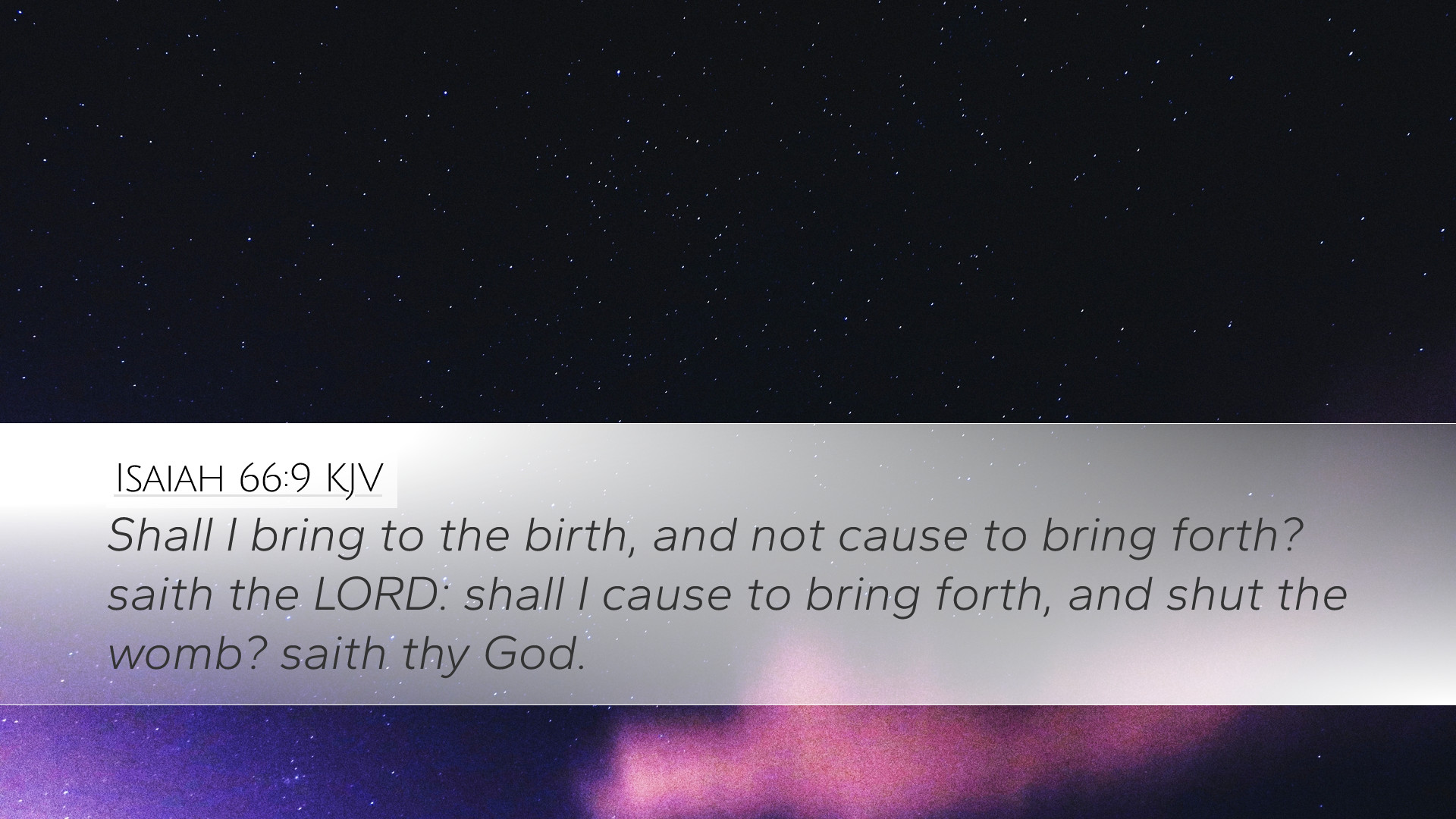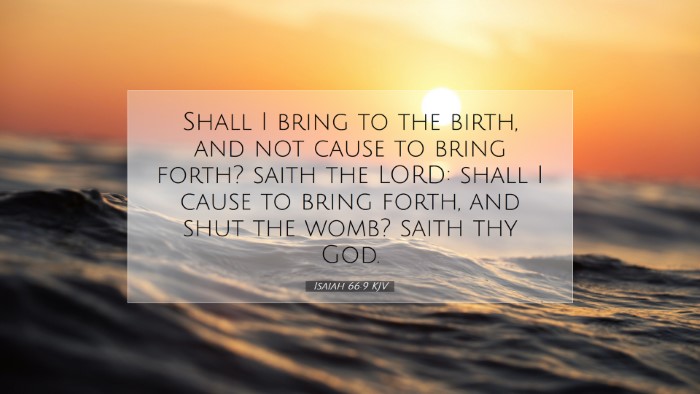Commentary on Isaiah 66:9
Isaiah 66:9 (KJV): "Shall I bring to the birth, and not cause to bring forth? saith the Lord: shall I cause to bring forth, and shut the womb? saith thy God."
Introduction
This verse, from the closing chapter of Isaiah, encapsulates a vivid metaphor that communicates God's faithful nature in fulfilling His promises. It stresses the certainty of divine actions, particularly in relation to the restoration and redemption of Israel. Within the broader context of the chapter, Isaiah outlines God’s intent to bring about a new order, where His chosen people will experience divine blessings, restoration, and the fulfillment of His covenant.
Contextual Background
Isaiah’s ministry spans from the reign of Uzziah to the downfall of Jerusalem, making his prophecies rich with themes of judgment and hope. The concluding verses of Isaiah provide a climactic vision of salvation, an assurance to Israel that God will not forsake them even amidst chaos. This promise of bringing forth represents spiritual rebirth and restoration, a key theme that reverberates through the prophetic literature.
Verse Analysis
Dividing the verse into its main components, we can observe the following:
- “Shall I bring to the birth”: This phrase epitomizes the initiation of a process—God’s sovereign act in starting something significant. It signifies the divine will to create or give life.
- “and not cause to bring forth?”: This rhetorical question underscores God's reliability. It highlights that what He initiates, He will certainly complete. In the Hebrew context, it can be viewed as a stark contrast to the failures of human expectations.
- “shall I cause to bring forth, and shut the womb?”: This part of the verse speaks to God's sovereignty over creation and life itself. The womb represents potential and the ability to bear fruit—an allusion to both literal childbirth and spiritual manifestations. Here, God asserts His power over life circumstances.
Theological Insights
The implications of this verse resonate with profound theological significance:
- God’s Sovereignty: The text reassures believers of God’s absolute authority over all creation. He has the power to initiate and fulfill His divine purposes.
- Faithfulness of God: Isaiah emphasizes that God is not capricious. He is faithful to His promises and will see them through. This principle is foundational for understanding God’s relationship with humanity.
- Assurance in Despair: For those in despair, this verse serves as a comforting reminder that God does not bring hardship without the eventual promise of deliverance. The imagery of childbirth, which in its pain leads to joy, symbolizes the hope of restoration.
Commentary Insights
Various public domain commentaries provide rich insights into this verse:
Matthew Henry
Matthew Henry emphasizes the metaphor of childbirth as a representation of God’s redemptive work. He writes that "God's bringing His people to the birth of a new life does not end in disappointment." Henry underlines God’s innate character of fulfillment and commitment to His covenant people, urging believers to trust in His timing.
Albert Barnes
Albert Barnes provides an analytical perspective, noting that this rhetorical question serves to remind Israel of God's past faithfulness. He suggests that the act of bringing forth refers not just to physical realities but also to spiritual realities—pointing to the coming of the Messiah and the establishment of the New Covenant.
Adam Clarke
Adam Clarke highlights the importance of understanding this verse in the context of God’s invitation to trust in Him wholly. He notes that the question posed highlights the impossibility of God failing to deliver what He has promised. Clarke argues that as God has provided for Israel in the past, they can assuredly trust Him for their future hopes and restoration.
Application for Believers
This verse is particularly meaningful for pastors, theologians, and students of the Bible as it provides a framework for understanding the character of God in relation to His people. Believers are encouraged to reflect on how they can embody trust in God’s promises in their ministry and everyday lives:
- Encouragement in Ministry: Pastors can use this verse to remind their congregations that God’s works are never in vain. They ought to proclaim and teach the faithfulness of God in their preaching and pastoral care.
- Assurance in Personal Faith: Individuals reading this passage are implored to maintain their hope, especially during trials. Believing that God will not only start but also complete the good work in them is essential for spiritual perseverance.
- Communal Restoration: As a community, the Church must embody the idea of spiritual birthing—actively participating in fostering environments where new life and redemption can occur.
Conclusion
Isaiah 66:9 stands as a powerful affirmation of God’s sovereign will in bringing forth life from despair. Utilizing the rich insights of historical commentaries, we find encouragement to trust in the faithful character of God, who promises that every beginning leads to fulfillment. The metaphor of childbirth serves as a poignant reminder of both the pain and joy inherent in the journey of faith. With this understanding, believers—be it pastors, students, or scholars—are both challenged and comforted to embrace God’s enduring promises in their lives and ministries.


